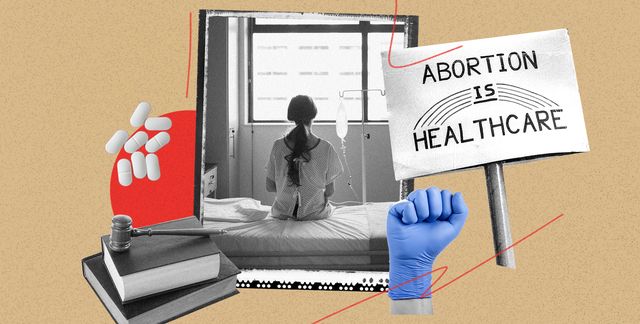
In the weeks since the Supreme Court overturned Roe v. Wade, alarming stories have emerged of pregnant people being denied necessary medical care in some of the 15 states that now ban all or most abortions. To name a few: a woman in Wisconsin bled for 10 days due to an incomplete miscarriage when emergency room staff refused to remove the fetal tissue; one Texas physician said they were told by hospital management not to treat ectopic pregnancies until they ruptured (a life-threatening event); and a Louisiana woman was forced to endure painful labor after her water broke at just 16 weeks, because doctors were told they could not do an abortion procedure.
“These laws are doing exactly what they were intended to do, which is to cause confusion and fear among clinicians, hospitals, and health systems,” said Dr. Biftu Mengesha, an OB-GYN and director of Innovating Education in Reproductive Health at the University of California, San Francisco. In addition to the chilling effect abortion bans have on doctors and other medical providers, experts worry they could also make patients hesitate to seek medical care when experiencing complications related to pregnancy or self-managed abortion.
Some of the horrifying stories in recent news also seem to be a result of hospital legal departments interpreting abortion bans in the broadest possible way, trying to avoid liability. “I think the extremely detrimentally conservative advice that some lawyers are giving medical providers in states with abortion restrictions will result in death,” said Lauren Paulk, senior research counsel at the legal advocacy organization If/When/How.
But it doesn’t have to be this way. For one thing, there are federal laws that protect patient privacy and access to emergency medical care. Experts say that hospitals could be doing a better job of upholding them, and the federal government could do more to enforce them. Here’s what you need to know about the rights you should have if you end up in the hospital with complications related to a pregnancy—and what still needs to change in order to keep you safe:
You have a right to emergency medical care.
In the last month, the Biden administration has taken some steps to remind hospitals of their responsibilities to pregnant patients under existing federal law. On July 8, President Biden issued an executive order directing federal agencies to take action to protect reproductive health care. In response, the Department of Health and Human Services issued guidance clarifying a federal law called the Emergency Medical Treatment and Labor Act, or EMTALA. This law requires that hospitals provide stabilizing medical care to any patient who is experiencing an emergency.
The document states: “If a physician believes that a pregnant patient presenting at an emergency department is experiencing an emergency medical condition as defined by EMTALA, and that abortion is the stabilizing treatment necessary to resolve that condition, the physician must provide that treatment. When a state law prohibits abortion and does not include an exception for the life and health of the pregnant person—or draws the exception more narrowly than EMTALA’s emergency medical condition definition—that state law is preempted.”
EMTALA’s definition of an emergency includes “serious impairment or dysfunction of bodily functions or any bodily organ,” which is more broad than the exceptions to many state abortion bans. But this will only empower doctors to do the right thing if the Biden administration follows up its statement with action. “The federal government took the first important step in issuing this guidance. The next important step is to enforce the statute,” said Greer Donley, assistant professor of law and director of the joint degree program in law and bioethics at the University of Pittsburgh School of Law. “They need to make the complaint process user-friendly and go after hospitals that are violating EMTALA.”
Though the federal government hasn’t taken action against any individual hospitals, it has signaled a willingness to go after states that try to circumvent federal law: On Aug. 2, the Department of Justice sued the state of Idaho, arguing that its abortion ban violates EMTALA. However, the state of Texas has also sued HHS, claiming that EMTALA does not cover abortion. There will likely be a lot of legal back-and-forth here, and even with federal protections, doctors say they need more support from their employers. “For individual clinicians, the potential consequences are weighty. If you are found to have violated an abortion ban, you could lose your license, face thousands of dollars in fees, or even be looking at jail time,” Mengesha said. “We need hospital leadership and system leadership to support clinicians who are acting within their rights and within the law.”
Dr. Tani Malhotra, a maternal-fetal medicine specialist in Cleveland who recently joined a group of over 1,000 Ohio physicians in speaking out against the state’s six-week abortion ban, agrees. “We need hospitals to say, ‘We will back you up.’ We need pro-choice legal counsel who understand the nuances of these situations. While they are there to interpret these laws in the broadest sense and understand potential legal risks, they should also be there to help physicians fulfill their obligations under the Hippocratic Oath,” she said. Small hospitals without large legal departments on call may need help figuring out what new state laws mean for them, she added. President Biden’s executive order mentioned convening volunteer lawyers to help protect patients, abortion providers, and hospitals, but it’s not clear yet what those services may look like.
You have a right to necessary medications.
Even outside of hospitals, overly broad interpretations of abortion bans are affecting people’s access to health care. “We also see it trickling into pharmacies, because pharmacies are concerned that they will be criminalized for providing people with the medications they need,” Mengesha said. Following Roe’s reversal, many patients reported having trouble accessing methotrexate, a drug that can be used to terminate a pregnancy but is also used to help control autoimmune conditions. Mengesha also worries about patients struggling to access misoprostol, which is one of the drugs used in medication abortion and miscarriage management but also has many other uses: it causes the cervix to soften and open more easily, so it’s often prescribed before procedures that require instruments to be placed inside the cervix, like IUD insertion and certain cancer screenings. Following the Supreme Court’s ruling, CVS—the country’s largest pharmacy chain—directed pharmacists in several states to verify the reason patients were being prescribed both of these medications before dispensing them.
The Biden administration has taken some steps to address this problem, reminding pharmacies that refusing to dispense medications related to reproductive health could violate federal law. Under the Affordable Care Act, pharmacies that accept federal dollars through programs like Medicaid and Medicare are prohibited from discriminating against patients on the basis of sex. That includes “discrimination based on current pregnancy, past pregnancy, potential or intended pregnancy, and medical conditions related to pregnancy or childbirth.” Again, how effective this guidance is will depend on how aggressively it is enforced. If a pharmacist is refusing to fill a prescription because of the possibility that you could be pregnant, remind them it’s a violation of your civil rights, and let them know you’ll be reporting it to HHS.
Health care workers should not report you to the police for self-managed abortion.
While only three states explicitly ban self-managed abortion, there are a number of other laws—such as fetal harm laws originally intended to protect pregnant people—that have been used to criminalize some for ending their own pregnancies or helping someone else do so. According to If/When/How, there were 61 such cases between 2000 and 2020. Shockingly, most of these people were reported to the police by health care workers. The most recent example was the case of Lizelle Herrera, who was arrested for allegedly self-managing an abortion in Texas in April. (Charges against her were ultimately dropped.)
It’s a common misconception among medical providers that they have to report self-managed abortion because of mandatory reporting laws. However, according to Paulk, not only is this unnecessary, in most cases it’s a violation of federal law. While mandatory reporting laws vary from state to state, “there is generally no reason for a health care provider to report someone for a self-managed abortion,” said Paulk. There are a few narrow exceptions to this: for instance, some states have injury reporting laws, so if someone were to resort to a less safe method of self-managed abortion, a hospital may be required to report a resulting injury to the police. “For example, if someone were to introduce a sharp object into their uterus, a hospital may have to report that injury to law enforcement. However, they would only need to report the injury itself, not the reason behind it,” said Paulk.
Remember that you do not have to disclose to medical providers that you took pills to end your pregnancy.”
The Biden administration agrees and is taking steps to educate medical professionals about what they should and shouldn’t disclose to police. HHS recently issued new guidance clarifying the much-talked about federal privacy law HIPAA, or the Health Insurance Portability and Accountability Act, confirming that the law prohibits health care providers from reporting suspected self-managed abortions to the police unless state law explicitly requires it.
Many people who self-manage abortions now do so using pills, a highly safe and effective method that is medically indistinguishable from a miscarriage when pills are taken orally. However, some people who take abortion pills will need follow-up care, and fears around criminalization, particularly for people of color, are valid. If you end up in this situation, remember that you do not have to disclose to medical providers that you took pills to end your pregnancy.
“The treatment for complications from self-managed abortion is no different than miscarriage management, so it shouldn’t be treated differently under the law. No one needs to disclose that their medical emergency was the the result of a self-managed abortion,” Donley said. Paulk added that providers in ban states can help protect patients by being mindful of what information they put in medical charts.
It’s also important to take care with your own digital security when seeking information about abortion. While HIPAA prevents health providers from disclosing information they obtain from you digitally, it doesn’t protect things like your search history or smartphone location data. You can learn more in this guide to abortion privacy from the Digital Defense Fund or this fact sheet from HHS.
Hospitals need to expand abortion access.
Even before abortion was banned at six weeks in Ohio, hospitals in the state provided very few. According to Malhotra, they typically only did so when a case was so complicated that it would have been unsafe for the abortion to be done in an outpatient setting. This is common; nationwide, only four percent of abortions take place in hospitals. But now, as more and more patients travel to access care, hospitals in states where abortion will remain legal need to expand their abortion services, said Dr. Jody Steinauer, an OB-GYN, researcher, and director of the UCSF Bixby Center for Global Reproductive Health. There are many ways that hospitals can make abortion more accessible in their own communities, thereby taking some of the burden off of overbooked clinics. For example, Steinauer said some emergency departments are piloting programs where they offer medication abortion to patients who want it right in the emergency room, with no need for a referral elsewhere.
Hospitals in ban states could also create referral networks to help physicians connect their patients with trusted abortion providers, said Malhotra. “I used to know the clinics here in Cleveland, but I don’t have all the information for clinics out of state, and with all the crisis pregnancy centers out there, it’s a lot of information even for me as a physician to sift through,” she said. “For patients, it could be impossible.” (The federal government should also put protections in place for providers who refer patients out of state so they don’t fear being sued for “aiding and abetting” abortion, said Mengesha. President Biden recently issued another executive order directing federal agencies to “study” how they can protect patients who need to travel for abortions, but details were sparse.)
One 2021 study estimated that if abortion were banned entirely in the United States, there would be a 21 percent increase in pregnancy-related deaths in subsequent years.”
And though abortion isn’t banned in every state, restrictive laws are clearly already endangering people’s lives, and hospitals need to be prepared to do everything they can to save their patients. One 2021 study estimated that if abortion were banned entirely in the United States, there would be a 21 percent increase in pregnancy-related deaths in subsequent years, with as much as a 33 percent increase in deaths among Black people, who already have the highest rates of pregnancy-related death in the United States. “We anticipate an increase in obstetric patients who didn’t have access to prenatal care or who are experiencing complications and people who might have sought abortions because they have medical problems but weren’t able to get one,” Steinauer said. “Hospitals need to convene specialists in various areas of medicine that take care of pregnant people with comorbidities to make sure everyone is ready to respond to that.”
She added, “Clinicians should be proactively meeting with hospital leadership to make sure everyone is prepared to do the right thing for patients. We need to think about how hospitals can be a safety net and provide the highest quality care.”
Garnet Henderson is a Wyoming-born, New York-based freelance journalist reporting on health and abortion access. Her work has appeared in publications including Marie Claire, VICE, WIRED, Glamour, Scientific American, Elemental, the Guardian, and others. She is also the host and producer of ACCESS: A Podcast About Abortion.






























:quality(85):upscale()/2025/05/06/835/n/1922564/8e601b95681a5cf04194c6.14070357_.png)

:quality(85):upscale()/2025/05/05/100/n/1922564/33582ae7681964cb0d40c8.72464171_.png)



![ABYSMAL RITES – “Restoring The Primordial Order” [Heavy Sludge] ABYSMAL RITES – “Restoring The Primordial Order” [Heavy Sludge]](https://horrornews.net/wp-content/uploads/2025/04/WHD581-600x330.jpg)